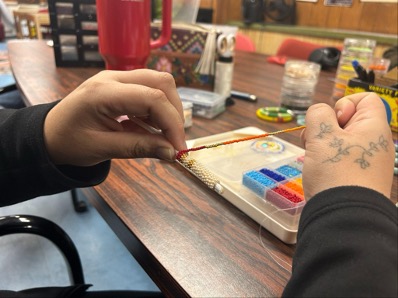The Josephine White Eagle Cultural Center (JWECC) held a beading night during Native Heritage Month with Angelina Laratunda on Nov. 19, where students learned to bead bracelets, necklaces, lanyards and more.
Laratunda, a 2021 alum of the University of Massachusetts Amherst, is of Abenaki and Métis heritage. She taught herself how to bead at 14 years old. Coming from a low-income family, she was jealous that she couldn’t afford the nice beadwork others wore.
“I didn’t really have anyone in my family to teach me,” Laratunda said. “There was like one single YouTube video that was a little helpful at the time … but for the most part I’m self-taught, so a lot of my early projects are really, really rough looking.”
She started selling her beadwork at around 16-17 years old to the community around her. In the summer, she would bead as often as possible and then sell her beaded work throughout the year. When she came to UMass, she worked at the Native American Cultural Center. Through her business, she was able to financially support herself through college.
When the center was brainstorming event ideas, she offered to run a beading class. Laratunda taught the typical style of the craft based on traditional beadwork with modernized native styles.
Laratunda ran the beading class once a week, almost every week for four years. She offered tips and tricks to students, so they didn’t have to go through the trial and error that she did. As an alum, after COVID-19 restrictions were lifted, she came back every other week to teach the class.
Madeline Batisti, a freshman earth systems major, initially joined beading nights because it looked like a good way to “connect with people and de-stress and … get crafty.”
Mari Elsa McBride, a junior anthropology major and education minor, who works at the JWECC and Stonewall Center, attends every beading night because her shifts are every Tuesday night, right during beading night events.
“It’s really nice in a community sense because I just get to catch up with everyone,” McBride said. “I’ve been doing this for 3 years now, but I’ve never actually made a bracelet because I’ve always been so focused on beading the moccasins that I make.”
During McBride’s freshman year after the moccasin making night, McBride went to the beading night to design and make her moccasins as “beautiful as possible.”
“There’s so many different tribes … the same way that all culture isn’t just one big thing,” Batisti said. “Everyone has their own traditions.”
“Beading as this art form is Native American in its roots and … I’ve always thought that it’s very nice to share your culture with other people and share traditions and art and let that be the way that people are introduced to what you do and what you love and who you are as a person,” Batisti said. “For my family, [we’re] very Italian. We have a lot of recipes that are very Italian and that’s what we like to share with people to celebrate our family and celebrate our heritage.”
However, despite the support within the native community on campus, funds and outside resources from the university are sparse.
“When I was a student, it was like every year they’d cut our funding,” Laratunda said. “They kind of cut stuff rather than expanding and trying to help us grow. They would tell us there’s native students on campus but wouldn’t help us connect with them.”
McBride said that some ways the university could support the native community would be to admit more native students and to be more inclusive. Another way would be to outreach with surrounding tribes to get more native students touring and feel more welcome on college campuses along with helping people apply.
UMass could also add a general education requirement for students to learn about the native history in the surrounding communities and tribes. To McBride, it’s scary that “people don’t know the history of the land they’re on and how they got to be here and how the university and the state came down on this land.”
“People are shamefully ignorant about Native American indigenous history here [at UMass], but also in the country,” McBride said. More “awareness and knowledge around indigenous people” would make sure that they’re “not just something that exists in a history book.”
“I wish people knew [the history of the university] and just when walking around campus and [seeing that] this isn’t in the past … its current and we were all going to class around this all day.” McBride said.
Kalina Kornacki can be reached at [email protected] or followed on X (formerly Twitter) @KalinaKornacki.








